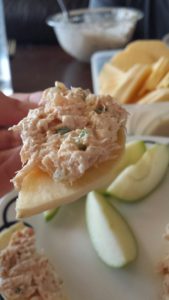It’s Friday! So let’s dig into another edition of Food Fact Friday.
For the Catholic community, it is officially Lent, which means many people will be eating more fish over the next 40 days. Today, I figured we would take a look at the health benefits of one of those fish, tuna.
If you are anything like me, tuna casserole was a staple during this time of year when you were a kid….and when my mom nailed the recipe, it was a favorite dish!
Since converting to a real food diet, most of the ingredients in tuna casserole are no longer in my pantry. But I still include tuna in my diet, and with more frequency. These days, tuna salad is one of my go-to quick lunches.
Some days, I stick with the basic pickle and mayo-based salad but other days, I mix it up! Recently, I have really been enjoying my tuna salad with capers instead of pickles. The capers add a lovely salty, briny flavor that goes so well with the fish.
Caper Tuna Salad

1 can wild-caught tuna (Wild Planet is my favorite brand)
2 tbsp. avocado mayo (Primal Kitchen is my favorite brand)
1 tsp mustard, Dijon or stone-ground
2-3 tbsp. capers
1 tsp dried dill
dash of smoked paprika
salt and pepper to taste
Drain tuna well. Combine all ingredients in a bowl and mix well. Serve with gluten-free crackers, apple slices, or thinly sliced rutabaga.
Tuna provides a wide array of nutrients.
Tuna is a rich source of omega-3 fatty acids. This combination of EPA and DHA supports your body’s anti-inflammatory processes. Keeping inflammation at bay will go a long way to keep you healthy. It is a big topic and will discuss it more in the future. Just know that you want to include plenty of healthy omega-3 fats in your diet to keep inflammation in check.
Consuming just 4 ounces of tuna will provide you with over double the amount of your daily recommendation for selenium. One of selenium’s key roles in your body is to support all sexual function. It also acts as an antioxidant, protecting you from cancer and cardiovascular disease.
Tuna also provides you with many of the B vitamins. This includes B3 which acts as a co-enzyme to break down fats, proteins and carbs. B12 is also readily available and is important for carbohydrate breakdown and assists in making DNA.
Wild-caught tuna is also a great protein source! I recommend enjoying 1 meal with tuna each week. This can be a simple tuna salad, sushi, or a grilled tuna steak! Enjoying it once a week will insure you are getting all the nutrients lists above and more! The other vitamins and minerals also include D, B1, B2, B6, iodine and magnesium.
What’s your favorite way to enjoy this light and healthy fish? Let me know if the comments!

